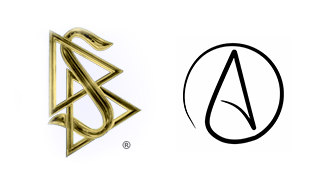Somehow there is a confusion about Atheism and Scientology. This comes from the fake “Atheist Commercial” on the Superbowl which actually is a commercial about Scientology. Look at them one after the other and see that the Atheism commercial is just an editing of the Scientology commercial. The atheist version never aired, but some people were led to believe it was.
An atheist approached me online to request an interview. His questions and my answers including references to Scientology scripture highlight exactly why some atheists can relate to the commercial and wanted to brand it as their own. Scientology emphasizes thinking for yourself.
The Interview
Atheist: Thanks for talking to me. I am interested in having a polite discussion, not a debate, about how you’ve come to accept Scientology as true.
Would you mind giving me a little background first on how you came to the belief?
Me: Sure thing. So basically I did not start off with Scientology. I started with a predecessor of the religion called “Dianetics” It’s a study based on the mind. It’s an unbiased look at the mind based on observable reactions, e.g.: https://www.youtube.com/watch?v=2Ov3yF4MsHk (I didn’t know what was behind the science at the time) I was just an unhappy 13-year-old kid with a developing “depression” problem. I had no real reason to not be happy, but I was miserable.
I took a personality test at a Dianetics Center and the person who did the evaluation showed me that the part of my life I needed improving in was: happiness. When he showed me that (it was true, and I knew it) I broke down into tears. After a bit he offered me to do the Dianetics Seminar. I did it and it really started making me happier. Regardless of how, my attitude toward life changed for the better, big time.
I continued doing things there and continued services, as they helped me in my everyday life. I was offered Scientology services as well and found that they worked as well. So my “belief” comes from my improved well-being since learning things from Dianetics & Scientology.
Does that answer your question in enough detail?
BTW, I looked at your website and can appreciate your inquiry. Seems like you have a very straightforward look on things. This article may be of interest to you as Mr. Hubbard provides a similar view on looking at things from objective and scientific view.
Atheist: Thank you so much for the great detail, Alex. And yes, I am a skeptic but I strive to be open to new ideas and concepts.
I noticed that you used the word “belief” – do you “believe” Dianetics (D) and Scientology (S) helped you, or would you say you “know” it? Cause there’s a difference: I may believe my dog was killed by a car because my kids called me, but I can’t really know it until I get home.
Me: Haha, good that you noticed the quotation marks there.
I definitely, without question, know that Dianetics and Scientology has helped me. But I say “believe” in quotes meaning that: Scientology is not meant to be believed, in how that word is normally used. In many belief systems or religions, one is told or asked to believe something. This is not the case in Scientology. I will quote Mr. Hubbard on this one, from “A New Slant on Life” article “How to Study Scientology”:
“He [person studying Scientology] should ask himself these questions: Does this piece of data exist? is it true? Does it work? Will it produce the best possible results in the shortest time? There is a way to answer these questions to his own satisfaction: find them himself.” …”
“It is not sufficient that an instructor stand before him and declare the existence of these. Each and every student must determine for himself whether or not the instructor’s statements are true”
-L. Ron Hubbard pg. 33-34 New Slant on Life
Basically Scientology (and Dianetics) are things that are meant for USE, NOT for “belief”. & one is encouraged to examine and choose out those things that one agreed with that can benefit oneself and put those principles or concepts to use or practice.
So I put “belief” in quotes because I do not believe in Scientology in the usual sense of the word. I do not think it to be a divine revelation. I’ve simply learned things from the basic tenets of Scientology that have made my life happier and better and abide my life by them.
The actual definition of a Scientologist, per the founder, is not a person who “Believes in Scientology” but a person who uses Scientology to improve his own life and the lives of others.
In this sense I know that it has helped me. Because I’m happier, because my IQ per actual tests has improved. Because I feel more comfortable doing certain things than I was before. Because I smile more. & because I have influenced others in a similar manner. This is a tangible change and not just because some “belief” exists in my mind. You are supposed to be skeptic when doing Scientology. Even in the same article I quoted from Mr. Hubbard he says: “Examine the subject of Scientology on a very critical basis…” lol.
Hopefully this answers your question there. 🙂
Atheist: Fabulous overview. Thanks. I too dislike the word “belief”. For example, I don’t like to say I “believe” in evolution. I “accept” evolution. The word “belief” carries too much baggage. It seems we have both share some similarities already, which is good to know.
I too try to view things critically. Would it be fair to say then Alex that you are evidence-based when it comes to determining what’s true? Also, would you say other Scientologists agree with what you wrote, or would some S’s disagre with what you wrote?
Me: Good to hear. And yes, it would be fair to say that I am evidence-based when it comes to determining what is true, but I would prefer to say result-based because evidence could be insufficient or irrelevant to me. I could have evidence that so-and-so can do some good, or has done some good for someone. Or even maybe some evidence that it could be good for me. That would not really matter very much to me, except to give it a shot to examine it. When I obtain personal results (rather than merely evidence) I know that this thing is useful, or true, for me.
And as for your other question, I cannot speak for every Scientologist. But I can assume that this mind set is prevalent. I have the belief that the best way to learn about Scientology is to get the ideas, tips, tenets, directly from the founder, L. Ron Hubbard, Otherwise, you can be subject to other people’s onions and interpretations, rather than only your own. In learning Scientology this way I doubt that people would develop a disagreement with what I’ve wrote, because that is basic and fundamental to Scientology & one of the things what sets it apart for me.
If I was taught the same things in an authoritarian way, quite possibly I would not have had the same results. So, I do not think that many Scientologists would disagree, but that’s the thing, it up to them. haha 🙂
Atheist: Just so I understand your first point, you are evidence-based but you are also results-based. However, you assign more weight to personal results than evidence (please correct me if I am mistaken on that summary!)
Do you have a good example of a time when you were presented evidence, but your results-based personal experience superceded that evidence? And I completely understand that you are not speaking for every Scientologist. I would never want to paint everyone with a broad brush 🙂
It seems like you put a lot of confidence in the founder. What is it about LRH that you see him as a reliable pathway to knowing something? I mean, why would LRH’s opinion be any different for you than say someone that has been into Scientology for 30 years? (and just let me add how grateful I am for your time and sincerity in helping me understand all of this!)
Me: I think you got the right idea. I do assign more weight to personal results than evidence. The reason for this is because evidence is merely someone else’s observation presented to you, and a result is your own observation. In the past, I have been presented evidence (or this case, it was more of advice than evidence, but it should show the point well enough) that in an argument or disagreement, after some time, it is best just to “let things cool off.” In direct opposition to this I’ve had, as part of my marriage vows within the Church, the promise to not go to sleep without resolving a problem with my spouse. So I’ve put this to the test, and continued to listen and talk to my wife and not give up to “sleep on it” as many might say, but instead actually get her side of the story. In the end anytime this has happened, we always resolve the problem (and are very happy with each other) even if it is very late into the evening (becoming morning almost).
I’m exaggerating a bit as we probably spend average about an hour talking it over whenever this happens; latest it’s been 1:30am or so. But this has resulted in an amazing relationship with my wife and honestly if we let that issue go that night, the next day we may never address it… and then who knows, there could be a gradual pent up resentment being generated through the years.
If this is not tangible enough an example for you I can speak of some others, but I believe it illustrates the idea that trying something and seeing that it works for you, is enough to adopt it as a personal viewpoint. Rather than me reading a study that says that XYZ will help my marriage.
Now, I have and do put a lot of confidence in the Founder, L. Ron Hubbard. I can tell you that this initially started when I realized that it was one man who took the time out of his life to impart what he had learned. He almost literally put his heart and soul into attempting to impart what he had learned from various sources and direct observation. (Hubbard spent a short stint learning from a pupil of Freud) I’ve really come to admire and respect him for what he easily could’ve left for himself. And I very much appreciate this.
And to make sure I make myself clear, an opinion of a 30-year Scientology could definitely be valuable. In many cases, the things that I do know, have come from a recommendation of a Scientologist to study a certain text or course or letter or something that they found useful by Hubbard. Without other Scientologists it would be exceedingly difficult, if not impossible, to learn how to practice Scientology.
But the thing is that getting something from the Source will always be more pure information than from a third party. Luckily, we Scientologists, have the amazing benefit of having the recorded teachings of Mr. Hubbard (Which, believe me, is the source of awe and envy from other religious people). In this fashion there is something preserved there. Possibly, even if Buddha did reach Nirvana (And by the way, Buddhists share this direct-observation rather than belief system), and even if he did codify it. There would be no way of us knowing it because It would’ve been altered by so many other people down the line.
I hope this is not getting too off-topic for you, but I feel that a little bit of background information may serve to better understand. A conglomeration of various individual’s ideas adding onto and changing or “improving” a philosophy (or a science) may always result in no semblance of that original philosophy or science to exist.
Now, I do not recommend that a person believe something just because L. Ron Hubbard has said it. I myself have followed many advices he has given, and almost one for one have come out much better for it. So I’ve adopted a confidence in him because of those results.
I do not always follow what he says or recommends. But I do at least consider it and see if it could help (only because, as a source I’ve benefited most from things I’ve learned from him).
My goodness, It gets a little hard to explain exactly. All I’m trying to say it, even the most devout Scientologists that I know do not try and give me “their opinion.” Generally they know that if I learn from them, rather than from Mr. Hubbard (the way they learned, I would then only understand a fraction of it. I have yet come to meet a Scientologist in any of the various churches around the world that I’ve visited (Canada, US, and South America) who would share their “take on Scientology” without at least referencing Hubbard in some shape or form as where they learned something.
For a brief understanding of Scientology and Mr. Hubbard, a good thing to know is that he has literally over 3,000 books and recorded lectures on the subject of Scientology, Dianetics, the mind, the spirit & the body personally authored by him. It is not a small subject
I will stop my answer at this point and leave it open to any question or mystery you may have at this point. So far your inquiries have been very on-point and precise. I feel that my response this time may be leaving you with questions or doubts, but do not know to which direction, and so I will leave that up to you, if you have any resulting question(s).
Atheist: Thank you for sharing something so personal with me, Alex. I truly appreciate it.
Are there EVER times where you would say, in that particular situation, scientific evidence edges out a personal experience, or does personal experience always win out no matter what for you?
I noticed you said you had recordings of Mr. Hubbard – it was an “amazing benefit”. Would you say these archives lend more credence to the confidence value one might assign to Scientology than say what Joseph Smith is reported to have said/done for Mormonism?
In short, why are recordings an “amazing benefit”?
I have a few more questions about what you wrote above, and I want to get to those, but I do not want to swamp you all at once. Perhaps you can just answer these new questions, and then I will ask a few more.
Me: It’s a good question you ask. “If scientific evidence would edge out my personal experience.” The answer is, yes, to a degree. It’s not black and white.
Let’s say I’m used to sitting down for the majority part of the day for almost my whole life. I’m “certain” (at this point I may have no doubts, you see?) that sitting is not a problem for me or my body. Perhaps I then read a study that sitting down all day is bad for the body (backed by scientific evidence). I have no real reason to reject this information and so I will accept it to a certain extent, although it is different to my previous idea.
However I won’t take it blind-sightedly. If I become less sedentary: sit less & follow whatever the study recommends and I feel no different at all, I might disregard it. Or if it was based on a long-term study or evidence and there would be no easy way for me to test that personally; I would give it the benefit of the doubt. This is because I have no way to really verify this information. Me changing my habit to be more active will not harm me. However, in this example, we have left the field of religion.
In my view, science and evidence can never be taken on pure “acceptance” that defies the very definition of science and what it stands for. An example of this in history is a famous disagreement from where blood was pumped to the body. “I would rather err with Galen than be right with Harvey!” was a watchword for many who claimed to be scientific. Galen was a guy who believed (and convinced many people) that the liver supplied the blood to the body. William Harvey proved that it was in fact the heart that supplied the body with blood. (I know of this example through the book Dianetics which cites this example as well)
The whole point is that I will not just take someone’s word or evidence without some sort of examination myself. However, with evidence, I can be convinced to take a closer look at the given subject and see what I can make out of it for myself. By this logic, scientific evidence will never come in conflict with my own experience, because my own experience IS scientific evidence.
Of course, there is error of observation and evidence can be slanted, altered, be biased, etc. evidence is only evidence. It is a way of attempting to prove a fact, and it is impossible for two contradictory facts to exist. So, by observing I will come to one of two conclusions: either I was previously mistaken or said “evidence” was mistaken. And sure, some evidence may cause me to observe and find that my previous idea was wrong . But a “fact” presented to me going against what I know to be true will never cause me to, without action, disregard what I know (or think I know) to be true.
Now for your next question of why having Mr Hubbard’s recordings is an amazing benefit. There is no doubt that what you are hearing, listening to, is Mr. Hubbard because you can recognize his voice. There is no faking there. If we had recordings of many wise-men of ages past, it is very likely that what they said is a vastly different than what we think they said today. Alterations are very common. You may be familiar with the game “Chinese Whispers” or “Telephone,” which illustrates the inability of people to transmit exactly what was said. By having everything recorded, one can ensure that the information is not watered-down and is preserved over time.
And of course, Mr Hubbard can be VERY funny. I often laugh when listening to lectures, honestly. He is really quite a character, there is even 1 filmed interview and 1 event that he was recorded giving, which are great as well.
I forgot to answer one part of a previous question, if Scientology archives lend more credence to the confidence than, let’s say Mormonism. Well, I’ll tell you that I know it is absolutely, unquestionably, L. Ron Hubbard speaking when I hear his same voice through many lectures. I am not familiar with the texts of the Church of Latter-Day Saints to say I would doubt their texts at all. However, I’m sure they would love to see or even hear their founder if they had the chance, and that fact may bring out increased confidence in that they have nothing “lost in translation” so to speak.
Atheist: Thank you so very much for your time and insight into Scientology, Alex. I wish you all the best.




This was a very enjoyable read, Alex! Your answers were excellent, as were the interviewer’s questions.. Thank you!